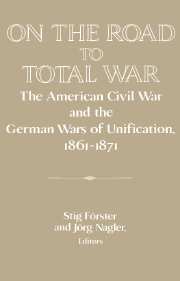Book contents
- Frontmatter
- 1 Introduction
- Part One Basic Questions
- Part Two Nationalism, Leadership, and War
- Part Three Mobilization and Warfare
- Part Four The Home Front
- 16 Loyalty and Dissent: The Home Front in the American Civil War
- 17 “The Better Angels of Our Nature”: Lincoln, Propaganda, and Public Opinion in the North during the Civil War
- 18 The Permanence of Internal War: The Prussian State and its Opponents, 1870-71
- 19 French Public Opinion in 1870-71 and the Emergence of Total War
- 20 Women and War in the Confederacy
- 21 German Patriotic Women's Work in War and Peace Time, 1864-90
- Part Five The Reality of War
- Part Six The Legacy
- Part Seven Conclusions
- Index
19 - French Public Opinion in 1870-71 and the Emergence of Total War
Published online by Cambridge University Press: 05 January 2013
- Frontmatter
- 1 Introduction
- Part One Basic Questions
- Part Two Nationalism, Leadership, and War
- Part Three Mobilization and Warfare
- Part Four The Home Front
- 16 Loyalty and Dissent: The Home Front in the American Civil War
- 17 “The Better Angels of Our Nature”: Lincoln, Propaganda, and Public Opinion in the North during the Civil War
- 18 The Permanence of Internal War: The Prussian State and its Opponents, 1870-71
- 19 French Public Opinion in 1870-71 and the Emergence of Total War
- 20 Women and War in the Confederacy
- 21 German Patriotic Women's Work in War and Peace Time, 1864-90
- Part Five The Reality of War
- Part Six The Legacy
- Part Seven Conclusions
- Index
Summary
In the twentieth century, total warfare has not only been a matter of material mobilization for the belligerent countries, but it has also involved psychological mobilization as well as an investment of public opinion in the war itself. From 1914 onward, total warfare has involved culture, attitude, and the phenomenon known as public opinion. Without taking these factors into account in international conflict, one cannot understand, for example, what French historians mean when they write about the “war culture” of World War I. Yet it was precisely this war culture, backed by a patriotism of exceptional intensity that was shared by civilians and soldiers alike, that explains the surprising tenacity of French society between 1914 and 1918.
There is little doubt that French patriotism reached its historical height between these two dates; historians are largely agreed on this point. But how intense was it during the Franco-Prussian War? Did the degree of investment of French society first in the Imperial war and then in the war of the Third Republic herald the unparalleled cohesion of this same society almost a half-century later? Were the seeds of total warfare present in public opinion, en sentiment, as early as 1870? In this chapter, I address these questions as part of a broader attempt to understand the relation of French society to war between 1792 and 1945. I place at the center of my analysis the issue that I deem to be the most essential-namely, the question of patriotism, which may be defined as the body of attachments-be they conscious, rationalized, or not - that connects the individual to the community that he belongs to and that forces him to defend it.
- Type
- Chapter
- Information
- On the Road to Total WarThe American Civil War and the German Wars of Unification, 1861–1871, pp. 393 - 412Publisher: Cambridge University PressPrint publication year: 1997

